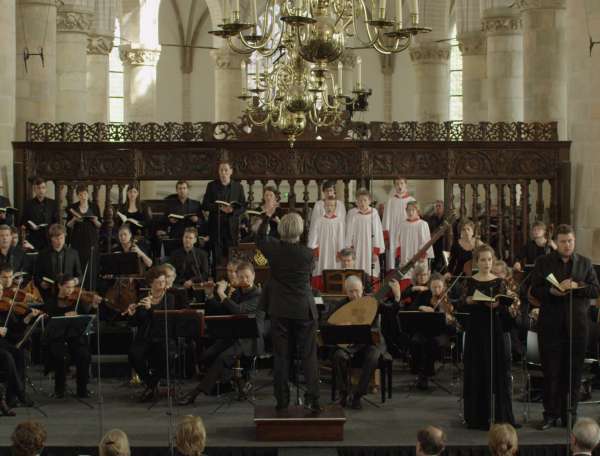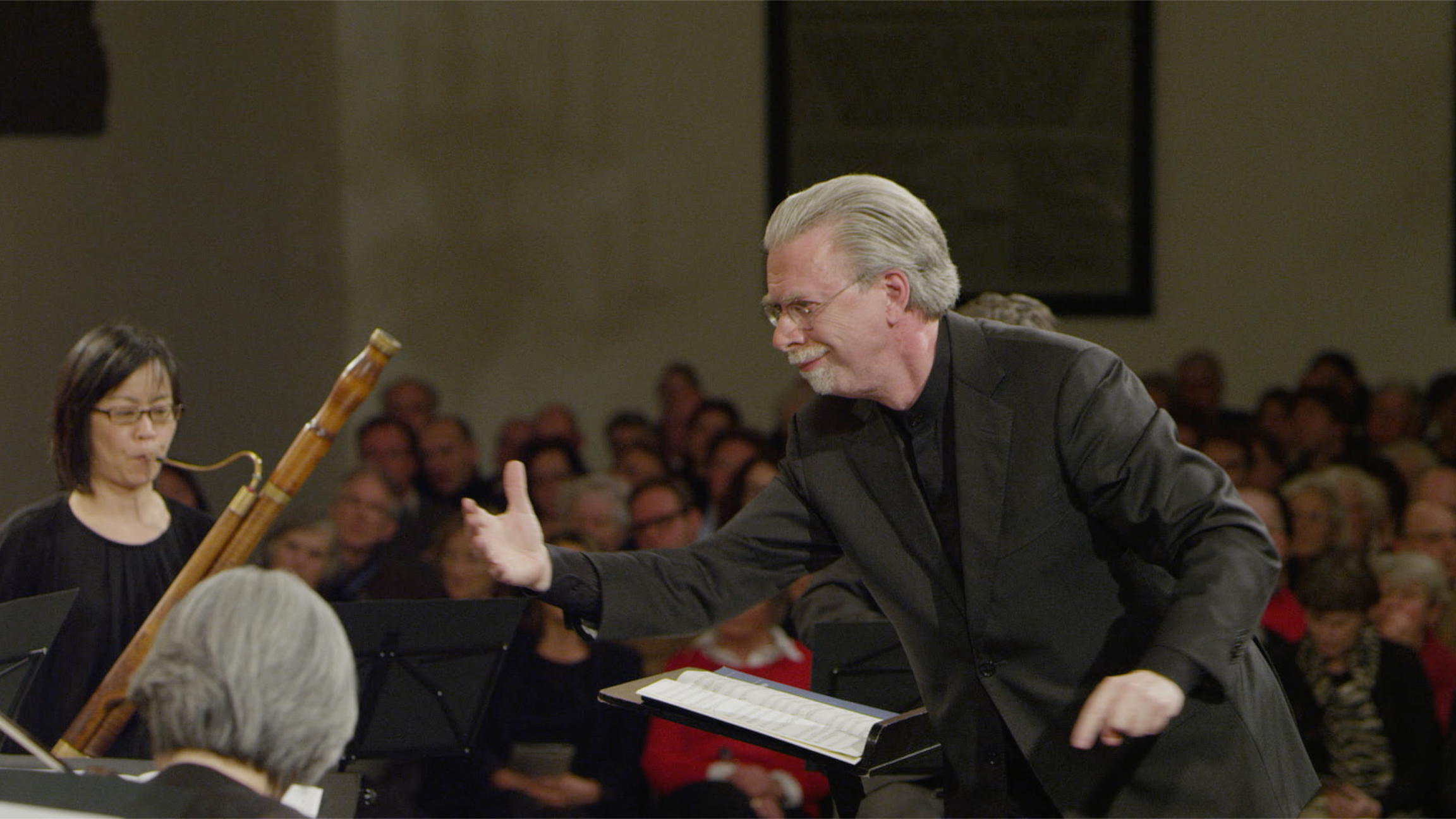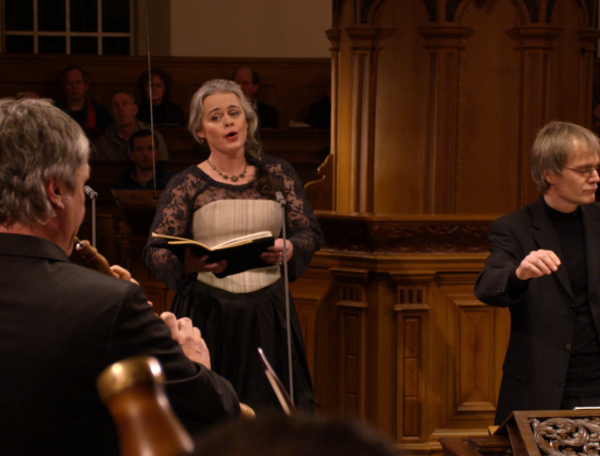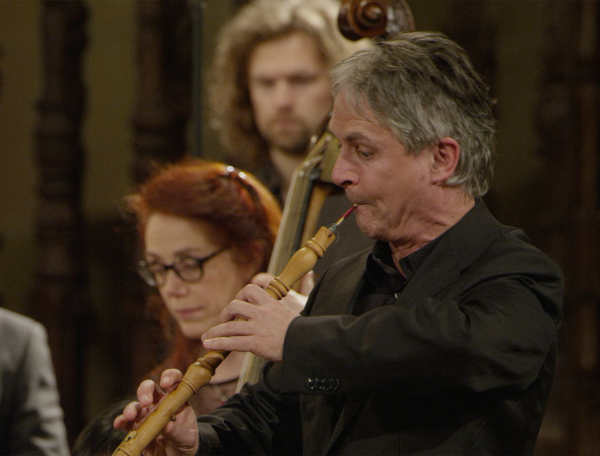

Nimm, was dein ist, und gehe hin
BWV 144 performed by the Netherlands Bach Society
conducted by Jos van Veldhoven
Grote Kerk, Naarden
Behind the music
Don't complain and go away
Bach changes the mood with his favourite hymn
It’s amazing what you can do with a hymn that appeals to you! Bach used the chorale ‘Was Gott tut, das ist wohlgetan’ for no fewer than seven cantata arrangements. The optimism and faith in God exuded by it must have touched him deeply.
Here, Bach uses the first verse as a turning point. The words of the cantata talk about the dissatisfied workers in the parable in the Gospel according to St Matthew. The opening comes straight to the point: don’t complain and go away is the strict message contained in a fugue, which is given to the men who think they have been underpaid. In the ensuing aria, a gentle alto encourages them to take satisfaction, although you still hear the echo of the workers’ grumble in the lower regions. The second chorale ‘Was Gott tut, das ist wohlgetan’ forms the turning point, where the message is ‘Have a little faith’. The tenor and soprano take the wise lesson to heart, following which the cantata closes aptly with the chorale that appears in the St Matthew Passion, among other works: ‘Was mein Gott will, das g’scheh allzeit’.
The key line of that final chorale, ‘Sein Will, der ist der beste’, must have lingered in the mind of Severus Gastorius as well. When he wrote the words to ‘Was Gott tut, das ist wohlgetan’ for his friend Samuel Rodigast, the latter’s life was hanging in the balance. However, he did not die and was able to set the words to music. Whether or not he was a great composer remains to be seen, as although he later became cantor in Jena, little of his music is known, and he based ‘Was Gott tut, das ist wohlgetan’ on a melody from a previously published collection of songs. We do know, however, that Rodigast was attached to the hymn, as his pupils sang it every week at his home. At his request, it was also performed at his funeral, when he died seven years later, in 1682.
Extra videos
Vocal texts
Original
1. Chor
Nimm, was dein ist, und gehe hin.
2. Arie (Alt)
Murre nicht, lieber Christ,
wenn was nicht nach Wunsch geschicht;
sondern sei mit dem zufrieden,
was dir dein Gott hat beschieden,
er weiss, was dir nützlich ist.
3. Choral
Was Gott tut, das ist wohlgetan,
es bleibt gerecht sein Wille;
wie er fängt meine Sachen an,
will ich ihm halten stille.
Er ist mein Gott,
der in der Not
mich wohl weiss zu erhalten:
drum lass’ ich ihn nur walten.
4. Rezitativ (Tenor)
Wo die Genügsamkeit regiert
und überall das Ruder führt,
da ist der Mensch vergnügt
mit dem, wie es Gott fügt.
Dagegen, wo die Ungenügsamkeit das Urtel spricht,
da stellt sich Gram und Kummer ein,
das Herz will nicht zufrieden sein,
und man gedenket nicht daran:
was Gott tut, das ist wohlgetan.
5. Arie (Sopran)
Genügsamkeit
ist ein Schatz in diesem Leben,
welcher kann Vergnügung geben
in der grössten Traurigkeit,
denn es lässet sich in allen
Gottes Fügung wohl gefallen.
Genügsamkeit.
6. Choral
Was mein Gott will, das g’scheh allzeit,
sein Will, der ist der beste.
Zu helfen den'n er ist bereit,
die an ihn glauben feste.
Er hilft aus Not, der fromme Gott,
und züchtiget mit Massen.
Wer Gott vertraut, fest auf ihn baut,
den will er nicht verlassen.
Translation
1. Chorus
Take that thine is, and go thy way.
2. Aria (Alto)
Do not murmur, dear man of Christ,
when your wish is not fulfilled;
rather be contented
with what your God has apportioned you,
He knows what will help you.
3. Chorale
What God doth is well done,
His will is just and lasts forever;
however He acts on my behalf,
I shall stand by Him calmly.
He is my God,
who sustains me
when I am in distress;
that is why I let Him prevail.
4. Recitative (Tenor)
Wherever contentedness reigns
and is at the helm,
there mankind is satisfied
with what God ordains.
But when discontent passes judgement,
grief and worry ensue,
the heart is not satisfied
and it is forgotten that
what God doth is well done.
5. Aria (Soprano)
Contentedness
is a jewel in this life,
that can bring pleasure
amid the greatest sadness,
for it consents to all
that God ordains.
Contentedness.
6. Chorale
May my God’s will always be done,
His will is the best will,
He is prepared to help those
who steadfastly believe in Him.
He helps us in need, this righteous God,
and punishes with moderation.
Who trusts in God, relies on Him,
him shall He never abandon.
translation © Richard Stokes
Credits
-
- Release date
- 30 October 2015
-
- Recording date
- 7 February 2015
-
- Location
- Grote Kerk, Naarden
-
- Conductor
- Jos van Veldhoven
-
- Soprano
- Gerlinde Sämann
-
- Alto
- Damien Guillon
-
- Tenor
- Charles Daniels
-
- Bass
- Peter Kooij
-
- Ripieno soprano
- Marjon Strijk, Hilde Van Ruymbeke
-
- Ripieno alto
- Elsbeth Gerritsen, Barnabás Hegyi
-
- Ripieno tenor
- Kevin Skelton, Endrik Üksvärav
-
- Ripieno bass
- Michiel Meijer, Drew Santini
-
- Violin 1
- Sayuri Yamagata, Pieter Affourtit, Hanneke Wierenga
-
- Violin 2
- Anneke van Haaften, Paulien Kostense, Lidewij van der Voort
-
- Viola
- Staas Swierstra, Jan Willem Vis
-
- Cello
- Lucia Swarts, Richte van der Meer
-
- Double bass
- Maggie Urquhart
-
- Oboe
- Martin Stadler
-
- Bassoon
- Yukiko Murakami
-
- Harpsichord
- Siebe Henstra
-
- Positive organ
- Leo van Doeselaar
-
- Film director and editor
- Lucas van Woerkum
-
- Music recording producers
- Guido Tichelman, Bastiaan Kuijt
-
- Director of photography
- Jorrit Garretsen
-
- Camera
- Jorrit Garretsen, Ruben van den Broeke, Diderik Evers, Maarten van Rossem
-
- Gaffer
- Zen Bloot, Harm Bredero
-
- Score reader
- Stijn Berkouwer
-
- Best boy
- Marcel Brugman
-
- Music recording assistant
- Micha de Kanter
-
- Camera assistant
- Wesley Westerhuis
-
- Interview
- Onno van Ameijde
-
- Producer concert
- Erik van Lith, Marco Meijdam
-
- Producer film
- JeanMarc van Sambeek, Jessie Verbrugh
-
- Acknowledgements
- Angela Mast, Marlo Reeders

